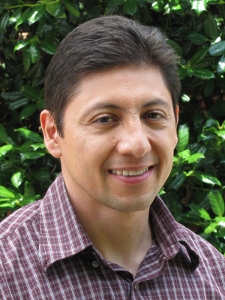Past NIMBioS Postdoctoral Fellow
Clemente Aguilar
 Dates: July 2013 – November 2014
Dates: July 2013 – November 2014
Personal Website
Twitter: @clementeA
Project Title: Prediction and rule inference of MHC class II epitope binder through logic minimization method
As a NIMBioS postdoctoral fellow, Clemente Aguilar (Ph.D. Computational Science/Biology, Univ. of Texas at El Paso, 2013) designed computational methods to identify short fragments of proteins capable of producing and immune response. As the discovery of small molecules is not easy using conventional methods, time and money can be significantly reduced by using computerization. Characterizing molecular fragments has the objective of assisting in the development of vaccines, immunotherapies and diagnostic tools. Upon completing his fellowship at NIMBioS, Dr. Aguilar accepted a position as a postdoctoral fellow in the department of biostatistics at MD Andersen Cancer Center in Houston, TX., working on the application of novel statistical and computational methods for the analysis of complex high-dimensional omics data.
LiveScience Profile Q&A with Dr. Aguilar: Investigating the Molecular Mechanisms of Disease Goes Digital
![]() NIMBioS Seminar: Computational characterization of GPI-anchored proteins in Trypanosoma cruzi and their potential use as vaccine candidates
NIMBioS Seminar: Computational characterization of GPI-anchored proteins in Trypanosoma cruzi and their potential use as vaccine candidates
Video Interview:
Computation for Chagas
Publications while at NIMBioS
Aguilar-Bonavides C, Sanchez-Arias R, Lanzas C. 2014. Accurate prediction of major histocompatibility complex class II epitopes by spares representation via l1-minimization. BioData Mining, 7:23. [Online]
Aguilar-Bonavides C, Cruz-Cano R, Lanzas C. 2014. Prediction and rule extraction of major histocompatibility complex class II epitopes by logic minimization. Proceedings of the International Conference on Bioinformatics & Computational Biology (BIOCOMP), pp 167-173. The Steering Committee of The World Congress in Computer Science, Computer Engineering and Applied Computing (WorldComp).
Presentations while at NIMBioS
Aguilar C. July 2014. Prediction and rule extraction of major histocompatibility complex class II epitopes by logic minimization. 14th International Conference on Bioinformatics and Computational Biology BIOCOMP'14, Las Vegas, NV.
Collaborations
Carolina Romo, National Institute of Pediatrics, Mexico City. Dr. Romo's lab is investigating the bacterium Helicobacter Pylori, and they are also interested in testing predicted epitopes. Testing with H. pylori was not part of my original NIMBioS proposal, but the algorithms are working with different pathogens. I have predicted the epitopes for this organism, and we are working on the manuscript with the results of the computational prediction.
Alexandre Ferreira Marques, Universidade Federal de Minas Gerais, Brazil. Dr. Margques' lab is interested in testing predicted epitopes from the parasite T. cruzi. To perform the testing, they have infected mice and serum from infected human patients. I have obtained predicted epitopes, and his group is currently testing the predictions.
NIMBioS Working Group/Workshop Participation
NIMBioS Investigative Workshop: Interface Disease Models, March11-13, 2014
NIMBioS Tutorial: Computing in the Cloud, April 6-8, 2014
Education, Outreach and Training
Modern Math Workshop 2014, SACNAS National Conference, October 15-16, 2014. Talk: How to go from digital circuits to vaccine development
Mentored undergraduate students for their participation at the 5th Annual Undergraduate Research Conference at the Interface of Biology and Mathematics, November 16-17, 2013. Poster: "Using bioinformatics to efficiently organize and analyze significant immunogenic epitope sequences in various stages of Trypanosoma cruzi"
Invited speaker, Howard University. Talk: Using computational tools for accelerating the development of vaccines for Chagas disease, November 8, 2013
Completed graduate course, CEM 503: Infectious Disease Modeling, UTK, Fall 2014
Participated in the "Best Practices in Teaching" program offered by the UTK Graduate School, January 22 – March 5, 2014
Attended weekly meetings in Ganusov lab
Regularly attended NIMBioS seminars
NIMBioS
1122 Volunteer Blvd., Suite 106
University of Tennessee
Knoxville,
TN 37996-3410
PH: (865) 974-9334
FAX: (865) 974-9461
Contact NIMBioS


